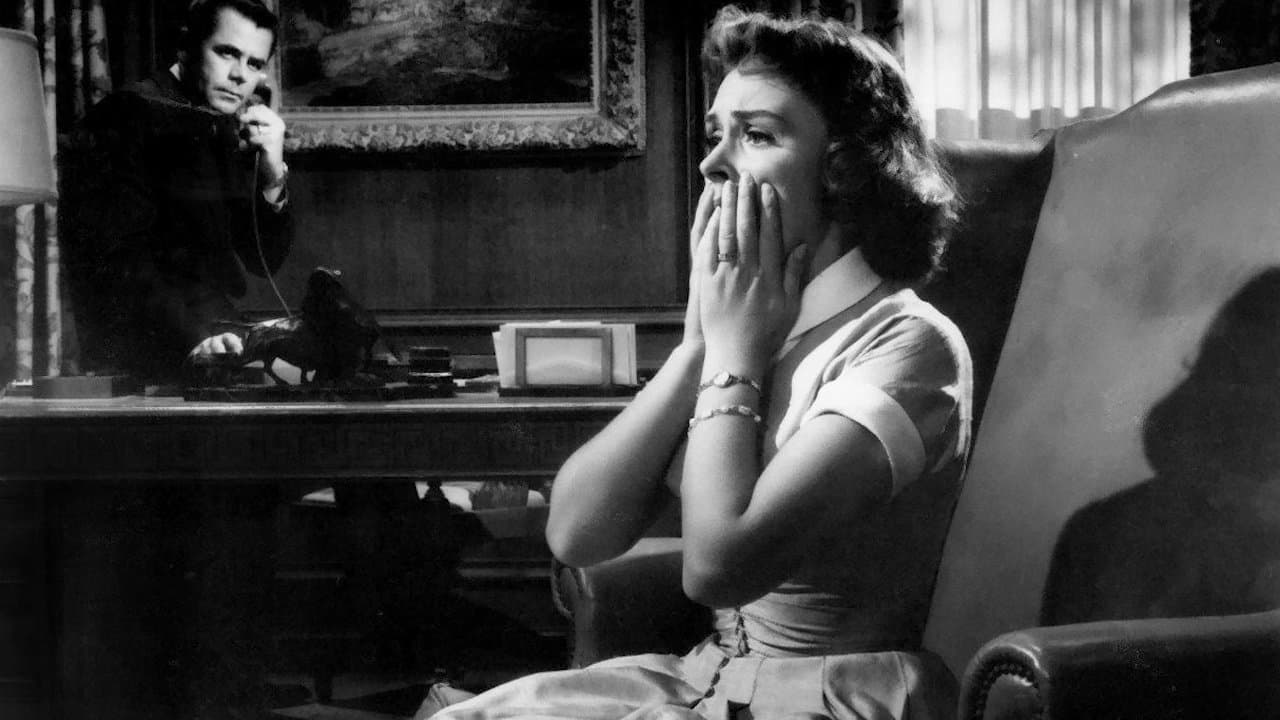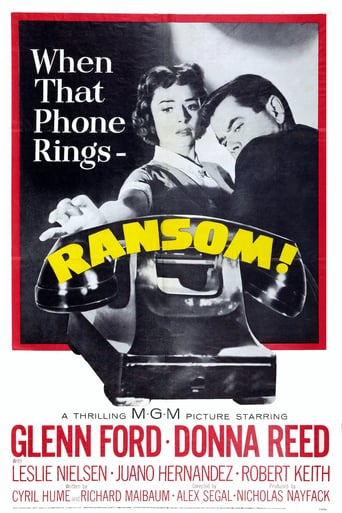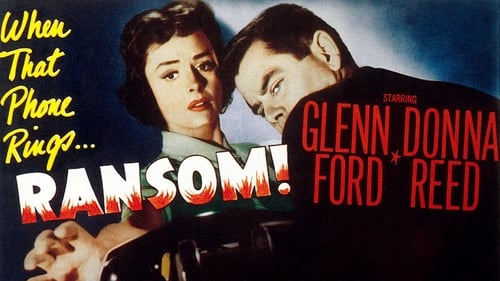


Very very predictable, including the post credit scene !!!
... View MoreI like movies that are aware of what they are selling... without [any] greater aspirations than to make people laugh and that's it.
... View MoreIf the ambition is to provide two hours of instantly forgettable, popcorn-munching escapism, it succeeds.
... View MoreThe movie turns out to be a little better than the average. Starting from a romantic formula often seen in the cinema, it ends in the most predictable (and somewhat bland) way.
... View MoreLove classic film and crime dramas/mysteries even more so. The more than capable cast further added to the interest (Glenn Ford and Donna Reed are always watchable and wanted to see how Leslie Nielson would fare in a very early dramatic role) and the idea was a great one with plenty of room for tension.'Ransom!' turned out to be a nifty and well above average film. It had room for improvement, on the other hand the good things were numerous and enormous. The Mel Gibson film may be better known, but like many others (although that film was quite well done and particularly worth watching for Gary Sinise), there there is a personal preference for the darker, more mysterious and more suspenseful yet not as flashy and more staid perhaps 1956 film, which today is criminally undervalued and generally has more substance.Is 'Ransom!' without faults? No. Donna Reed tries her best but the character is underdeveloped and lacks subtlety, causing Reed to overdo the hysteria especially. Occasionally it's a bit static.Plus it would have been even better if the villains were not as thinly sketched, though that they remained unseen did provide a mysterious edge, and the ending (although slightly touching and thankfully not improbable) less anti-climactic, overwrought and lacking resolve.However, 'Ransom!' is particularly worth seeing for Glenn Ford who gives a superb performance, very deeply felt, suitably stern and often restrained. Juano Hernandez is a sympathetic and heartfelt moral compass (the subplot gave the film heart), while Robert Keith and Juanita Moore are good support. Leslie Nielson fares well in a dramatic early role though he did go on to better things. The villains could have had more meat to them but they do provide some menace and there is a good amount of tension where one cares for the situation (helped by that the lead character here is better fleshed out), something that Gibson's version didn't quite have.The story is more deliberate, but there is a real air of suspense and dread without any gratuity or overblown action to cheapen it. It is also generally far more plausible, whereas Gibson's version unravelled in that aspect near the end. The script is taut, lean and thoughtful while the film is competently if not always imaginatively directed. 'Ransom!' looks suitably atmospheric and is very nicely shot.Overall, good and well done film if not without things that could have done with some tweaking. 7/10 Bethany Cox
... View MoreGlenn Ford and Donna Reed star in this story of a prominent rich family, because the father's in the vacuum cleaner business, making them, not selling. Because he's in the public eye and rich, his son is ripe for the taking, anyone might think. And, they can get quite a big ransom for the boy. Think again. Glenn Ford's just a little smarter than your average dad, or maybe crazier. He decides not only to not pay the ransom, half a million dollars, but instead is putting it on the head of the abductor and in effect turns the tables on him. The film starts out well and is at best a very emotional roller-coaster ride, as both Donna and Glenn break down. Donna Reed is especially good, and gives a memorable performance in one scene in particular, as she is remembering the day her baby was born. But the climax of the film is seeing Glenn Ford, live on a television broadcast, vowing to get his enemy no matter the cost. From there, the film, quite frankly, drags. The film's main attribute is the acting, as some of the dialogue throughout is awkward and unrealistic. The fact that he doesn't pay the ransom and his speech are the most distinctive things about the picture. In fact, I'm surprised they made a full film about it, because essentially there was no story to really tell. Leslie Nielsen makes his screen debut as a nosy and pushy reporter who wants a scoop. The Mel Gibson remake had a stronger ending, but at the same time makes the viewer feel as if, is this really appropriate? All in all, if you are curious about the original "Ransom," I would recommend it to see the stars in some strong acting performances, but this film is really a one-time deal.
... View MoreRANSOM! Premiered August 27th of 1956, it was both produced and distributed by Metro-Goldwyn-Mayer studio. The screenplay was written by Cyril Hume and Richard Maibaum and was based on their teleplay "Fearful Decision" for the ABC network television show The U.S. Steel Hour (1954). I like that original title better, FEARFUL DECISION. Of the director Alex Segal little is known other than he mostly worked in television and aside from tonight's film he is best remembered for making NO TIME FOR SERGEANTS, ALL THE WAY HOME, JOY IN THE MORNING and winning an Emmy for his 1966 version of DEATH OF A SALESMAN. During the 1950's -- Hollywood's originality was on a decline and often filled with remakes of sequels. (not like today!) On the fast growing medium of television more risks were being taking and better stories were then sold to Hollywood to make feature films. Other examples of original TV productions becoming major motion pictures are MARTY, REQUIEM FOR A HEAVYWEIGHT, 12 ANGRY MEN, DAYS OF WINE AND ROSES, etc. Among tonight's character actors to look for are: Juanita Moore the sweet round faced African-American actress who plays Shirley. Juanita Moore would be Oscar nominated three years after this for her amazing performance in the 1959 version of IMITATION OF LIFE.Next look for Alexander Scourby who plays Dr. Paul Gorman. He was famous for his rich British accent that he used in voiceovers and narration, seldom did he mention the fact that he was really from Brooklyn, New York. Most of you will recognize the balding actor playing Chief Jim Brackett but you may not know his name, that's Robert Keith who in real life was the father of Brian Keith of TV's FAMILY AFFAIR fame. Juano Herandez plays Uncle Jesse Chapman that's always quoting the bible. Hernandez was one of the first "new style" black screen actors, who neither sang nor danced but played characters just as white actors did. He's amazing in a little southern drama called INTRUDER IN THE DUST. How many of you are fans of the 1980 comedy AIRPLANE? Well AIRPLANE made a major star out of Leslie Nielsen who has appeared in over 100 movies RANSOM was his very first movie! Leslie plays Charlie Telfer is still working today at the age of 83! Nielsen was born in remote Saskatchewan, Canada the son of a Canadian Mountie. He studied acting at a school run by future Bonanza TV star Lorne Greene and studied dance under no less than Martha Graham! After RANSOM he appeared in the sci-fi classic FORBIDDEN PLANET, the romantic comedy TAMMY AND THE BACHELOR with Debbie Reynolds, then later the disaster epic POSEIDON ADVENTURE. After returning to television in POLICE SQUAD he found even more success making THE NAKED GUN films and there many spin offs. Wholesome Donna Reed was discovered to no surprise in a beauty pageant and with rare exceptions, she mostly portrayed sincere, wholesome types, loving wives and girlfriends. Her most famous role was playing Jimmy Stewart's sweetheart in IT'S A WONDERFUL LIFE but when she played a prostitute in FROM HERE TO ETERNITY she won an Oscar for Best Supporting Actress of the year! Soon after this film she retired from the big screen and was a great success starring in her own TV series, THE DONNA REED SHOW which ran from 1958 through 1966. But the real star of tonight's film is the under rated Glenn Ford who was so good at drama, comedy and westerns he made it look easy. Gwyllyn Samuel Newton Ford was also Canadian and didn't go on stage until the ripe old age of 4 in Tom Thumb's Wedding. After his family moved to California he excelled in theater and was put under contract by Columbia studios who kept him busy in lower budget B films until WWII came along and he joined the Marines. After the war he jump-starting his career in 1946 with the film noir classic GILDA, co-starring Rita Hayworth (they would become life long friends, neighbors and when she passed in 1987 he was one of her pallbearers.) While he insisted that he "never played anyone but himself on screen," Ford's range was quite extensive. He was equally effective as a tormented film noir hero (THE BIG HEAT & HUMAN DESIRE) as he was in light comedy (TEAHOUSE OF THE AUGUST MOON & THE GAZEBO). Nearly half of his films were Westerns, many of which — THE DESPERADOES, THE FASTEST GUN ALIVE, 3:10 TO YUMA, COWBOY — were among the best and most successful examples of that highly specialized genre. He was also quite effective at conveying courage under pressure: While it was clear that his characters in such films as THE BLACKBOARD JUNGLE and RANSOM were terrified by the circumstances surrounding them, it was also obvious that they weren't about to let that terror get the better of them. In 1958, Ford was voted the number one male box-office attraction. He would go on to make more films and appear in several TV series but illness forced him to finally retire in the 1990s and he never got that Oscar for lifetime achievement that many, like myself believe he deserved. He passed away in 2006 but fortunately we still have most of his 106 titles preserved so that we can enjoy spending a little more time with this fine actor. In 1996 director Ron Howard remade this film with stars Mel Gibson and Rene Russo and it's a fine film, but the writers added several subplots, car chases and explosions. I think they just wanted to sell more tickets but this earlier version wanted to a story.
... View MoreThere are no saving graces in this dreadful, stagey, boring snooze-fest, which brings to mind "The Ransom Of Red Chief"! Even though there are some big stars in this film, the acting is almost uniformly terrible. Glenn Ford, normally a laid-back kind of guy, hams it up with forced emotion. Donna Reed is so over-the-top as to prove laughable. Leslie Nielson is woefully miscast and is terrible. The son is such a repulsive little brat, I found myself rooting for the kidnappers. The only decent performance in this mish-mash is the relatively minor role of the butler. Perhaps I'm being too harsh on the actors, after all, all they did were to read the lines given them in the script. Ah, the script, that turgid piece of contrived dreck that would like to tug on your heart strings but merely turns your stomach.
... View More